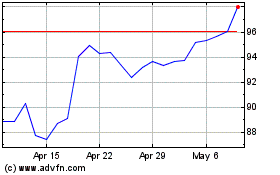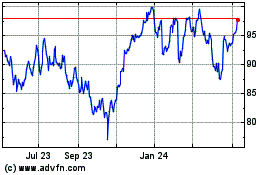With Coronavirus Lockdown Lifted, Chinese Splurge on Big Luxury Brands -- Update
17 April 2020 - 7:34AM
Dow Jones News
By Matthew Dalton
PARIS -- Spending in China on some of the biggest high-end
brands has surged since the country's lockdown ended, luxury goods
companies said, offering hope to an industry that has been slammed
by the coronavirus pandemic.
LVMH Moët Hennessy Louis Vuitton SE, the industry's biggest
company, Thursday said Chinese shoppers have flocked back to its
boutiques in mainland China when most of them reopened in March.
LVMH owns Louis Vuitton, the world's biggest luxury label, Dior,
Fendi and dozens of other brands.
Sales in China for most of LVMH's brands turned positive
compared with a year ago in the second half of March, said
Jean-Jacques Guiony, LVMH's chief financial officer.
"In April, for the large brands, we've seen very high growth
rates in mainland China," Mr. Guiony said, "sometimes in excess of
50%. So it really shows the appetite of Chinese people after two
months of lockdown to come back to stores and come back to their
previous patterns of consumption."
Still, overall spending by Chinese shoppers was down for the
quarter, Mr. Guiony said. That is because Chinese shoppers do most
of their luxury spending on trips abroad to European capitals, big
U.S. cities and elsewhere. With international travel locked down,
it is unclear when Chinese will have the chance, or the desire, to
splurge again overseas.
Overall sales at LVMH were EUR10.6 billion ($11.5 billion) in
the first quarter, down 17% after accounting for currency
fluctuations and other factors. That was in line with analysts'
expectations. LVMH's boutiques in China were closed for February
and the first half of March, when the coronavirus swept through
Wuhan province and threatened the entire country. Boutiques across
Europe and the U.S. were shut in March, when Western governments
locked down their economies to contain the pandemic.
L'Oréal SA, the world's biggest cosmetics company by sales, also
said the Chinese market for luxury goods was rebounding. Sales at
its luxury cosmetics division, whose brands include Armani and Yves
Saint Laurent, were down 8% in the quarter. But in China, they
showed "clear and encouraging signs of a recovery in consumption,"
the company said Thursday.
When China locked down in January, luxury brands' reliance on
Chinese consumers was seen as a liability. Now those shoppers have
become the industry's bulwark against catastrophe, analysts say.
High-end brands have reopened most of their Chinese boutiques, as
the West remains locked down.
Chinese shoppers are the industry's most important clientele,
representing more than a third of all revenue, according to Bain
& Co. Some of them have already begun documenting on social
media lavish purchases with the reopening of the country's luxury
boutiques.
LVMH is considered a bellwether for the global luxury industry,
with 75 brands operating in dozens of countries. In recent years,
however, LVMH's biggest brands have outperformed the industry;
smaller, independent labels lack the resources to compete with the
French conglomerate.
Analysts expect that the crisis could magnify the advantage
enjoyed by bigger companies such as LVMH and the industry's most
well-known brands -- such as Louis Vuitton, Hermès, Chanel and
Gucci.
"The bigger brands will exit this crisis with a massive
advantage from pent-up demand," said Erwan Rambourg, luxury analyst
at HSBC. "People might be thinking, 'I'll buy less but better.'
"
LVMH said it was taking steps to conserve cash, including
slashing its 2019 dividend by 30% and cutting capital expenditure
this year by 40%. The company is also negotiating with landlords
across the world to cut rental payments for boutiques that were
locked down.
Landlords in China have largely been willing to accept LVMH's
requests, but those in the U.S. and Europe have been tougher, Mr.
Guiony said.
"We have gained some rental reductions, but a minority of
landlords are being quite inflexible," he said. "This is a bit
disappointing and will have long lasting consequences for how we
deploy our capital in the future when things return to normal."
LVMH brands such as Louis Vuitton or Sephora that have strong
e-commerce operations have seen online sales surge during the
crisis, Mr. Guiony said.
"It offsets a sizable portion of the drop we are witnessing in
the brick and mortar business," he said.
Write to Matthew Dalton at Matthew.Dalton@wsj.com
(END) Dow Jones Newswires
April 16, 2020 17:19 ET (21:19 GMT)
Copyright (c) 2020 Dow Jones & Company, Inc.
Loreal (PK) (USOTC:LRLCY)
Historical Stock Chart
From Dec 2024 to Jan 2025

Loreal (PK) (USOTC:LRLCY)
Historical Stock Chart
From Jan 2024 to Jan 2025
